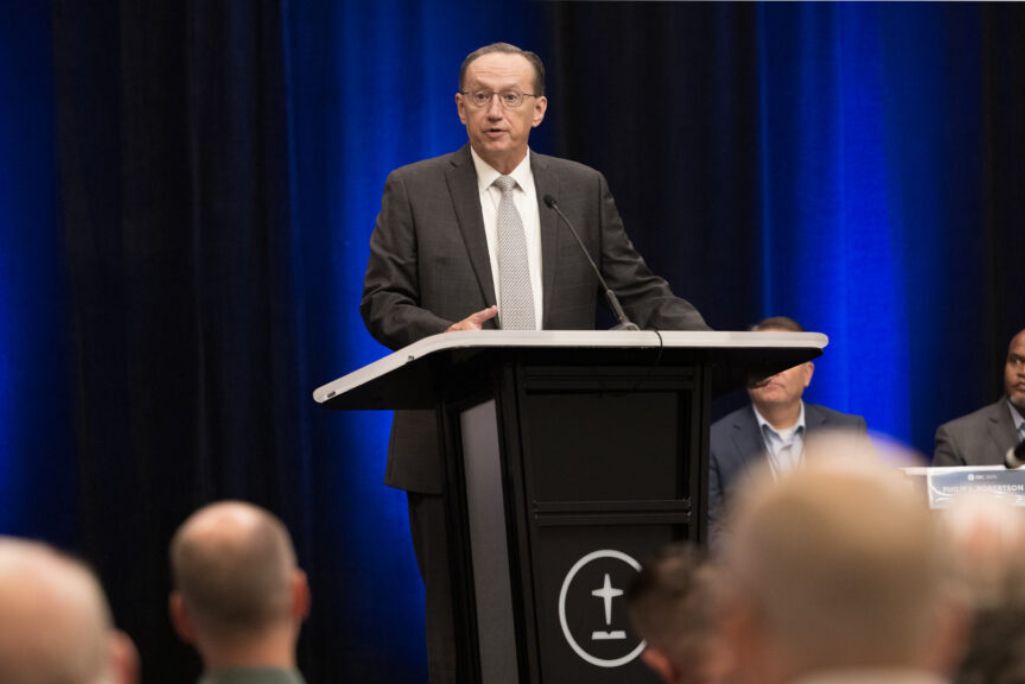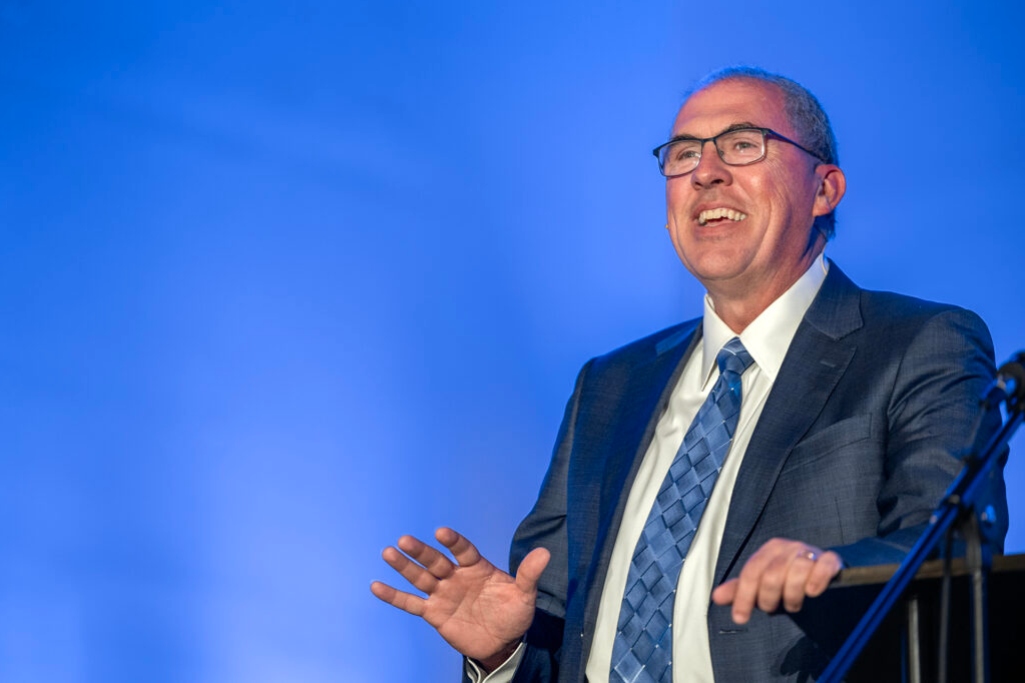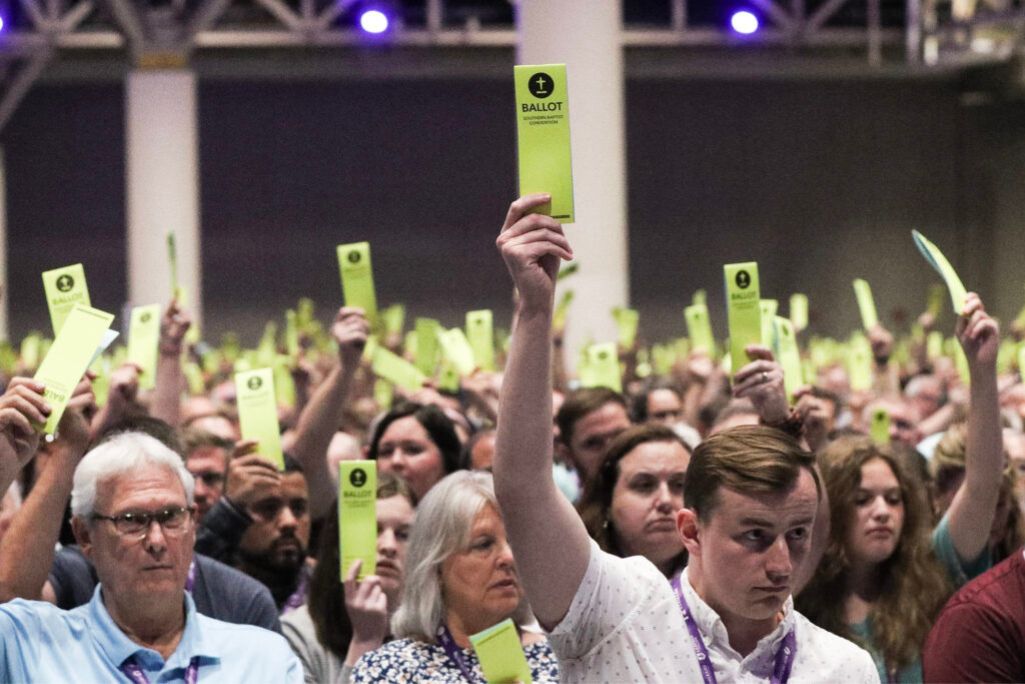
SBC Executive Committee President Jeff Iorg speaks during the EC's meeting Sept. 17, 2024, in Nashville.
One of the most important new sentences in the Southern Baptist Convention’s proposed revised Business and Financial Plan is in the first section — The Cooperative Program (CP). Under the heading Priority, the plan declares, “The financial health of the Convention is predicated on generous giving by churches through the Cooperative Program, and the Convention appeals to churches to prioritize giving through the Cooperative Program.”
That’s more than denominational promo-speak; it’s the financial foundation on which the full document rests and the foundation of our future financial health. While much of the public discussion about the revised plan centers on various details, nothing in the plan matters much if there is not a corresponding commitment to provide funds to manage through robust Cooperative Program giving. Many of the concerns the plan addresses — like entity fundraising — would be lessened or eliminated with more generous Cooperative Program giving.
The hard truth is Cooperative Program giving has been in a multidecade decline. Using 1990-91 as a baseline, Southern Baptist churches contributed 9.53% of their unrestricted revenue through the Cooperative Program — a total of $363,967,833. In 2024, the percentage had dropped to 4.48% providing a total of $449,039,992 for use by state/regional and the national convention. The Southern Baptist Convention (SBC) hopes to receive $190 million in national Cooperative Program gifts in 2025-26. Imagine what that number would be if churches had maintained their percentage of giving at 1990 rates. Our national Cooperative Program budget for next year would be about $400 million — a staggering increase over what is projected.
Many opinions have been offered about why churches have slowly lowered the percentage of unrestricted gifts they forward through the Cooperative Program. These days, the most frequently cited reasons are lack of confidence in entity leaders or costs associated with sexual abuse investigations and litigation. While these may explain some recent reductions, they do not explain more than 30 years of decline. Various demographic, economic, cultural and spiritual reasons for this trend have been suggested but none of them strike at the core problem.
The core problem is a worldview shift that has marked Western culture, and unfortunately bled into SBC life over the past three decades.
The problem is the pernicious, fracturing influence of expressive individualism — the dominant worldview of our generation. Expressive individualism is the root of cultural developments ranging from obsessive sharing on social media to convincing children they can choose their gender. It is the worldview which demands mass customization and convinces people personal gratification is their birthright. Southern Baptists live in this cultural milieu. It is inevitable we have been influenced by it. Expressive individualism is antithetical to cooperation and is the underlying philosophical reason for the decline in Cooperative Program giving.
Cooperation means we work with people who do not agree with us on everything. Expressive individualism insists you have your way and will only work with people who agree with you or better, will reward you for your individual choices. Cooperation means you sacrifice to achieve common goals, not personal success. Cooperation means you surrender control which is anathema to expressive individualists. The current tribalism and continual reshuffling of sectarian loyalties in the SBC is a byproduct of expressive individualism. People demand their positions prevail and continually realign with others who share their perspective, making for an ever-changing kaleidoscope of collaborations.
While increased Cooperative Program giving would be helpful, it will likely not occur until a deeper commitment is addressed that will determine our future. Southern Baptists must first recommit to cooperation — rejecting expressive individualism and the inroads it has made. The current generation of leaders must decide cooperation — coming together for the common goal of our global mission — is the best biblical methodology available. We must reaffirm the messiness of cooperation, particularly as we become more geographically, racially, economically and politically diverse. We must affirm cooperation and then see funding it through the Cooperative Program as its natural outflow, not its cause or source.
Our current conflicts and dysfunctions might cause us to believe a call for renewed cooperation is futile. But that ignores an amazing historical reality. It was when our denominational situation was bleak that an all-out commitment to cooperation produced the Cooperative Program.
The national economy was booming, yet uncertainty was in the air because of governmental decisions (which later produced the Great Depression). The SBC was reeling from financial challenges brought on by dubious decisions and legal losses (losing millions in today’s dollars). Denominational confidence was low due to debatable results of major initiatives resulting in uncertain financial support. The convention was mired in theological disputes over soteriology and ecclesiology (Fundamentalism and Landmarkism). Prominent pastors sniped each other in newspapers and on radio programs, creating dissident camps polarizing churches. All in all, the 1920s were a tough time for Southern Baptists.
In that percolating maelstrom of denominational uncertainty, solutions were needed. The old societal method of state and national convention entities employing agents to fundraise on their behalf was failing. Even though external circumstances mitigated against any shared solutions, courageous leaders reaffirmed cooperation and proposed the Cooperative Program.
The Cooperative Program, while commonplace to us, was a never-before-attempted method of funding shared ministry and mission efforts. It depended on cooperation, not coercion. It was voluntary, not in response to appeals. It was based on serving others, requiring leaders to promote common success instead of individual recognition. It put everyone on the same team — all sharing a common financial funding source — so every boat could rise with the tide.
Given the circumstances at the time — when every organization was desperate for money and chaotic uncertainty roiled the denomination — it was incredible those leaders had the courage to call for cooperation as the solution to their problems. And yet, they did — which brings us to today.
Our situation is much like the 1920s. We are facing national financial uncertainty due to governmental turmoil. The SBC is reeling from $13 million in financial losses caused by past decisions and resulting legal challenges. Denominational confidence is low because of recent scandals. We are still mired in theological debates over soteriology and ecclesiology. Social media personalities clamor daily for attention and attack us regularly. All in all, it’s still a tough time to be a Southern Baptist.
And like our forefathers, we have choices to make. We can drift toward societal methods — an every-entity-for itself mentality with uneven rewards. We can redefine the Cooperative Program, making it a modified-societal plan for integrated giving of diminishing resources. We can refocus denominational giving — no matter what we call it — built on direct appeals to individuals instead of churches.
We can choose any of these options, but my appeal is to make a different choice. My appeal is to reaffirm our commitment to cooperation and the Cooperative Program in its simplest form — a shared funding mechanism for state/regional conventions and the national convention to substantially provide the funding needed for all our work.
The Cooperative Program has fueled Southern Baptist ministries for the past 100 years. During that time, no denominational or parachurch groups — and it’s not even close — have experienced what God has done through Southern Baptists.
We have sent missionaries, started churches, strengthened churches and produced seminary-trained leaders.
We have built universities, foundations, hospitals, retirement centers, children’s homes, conference centers and camps.
We have developed or enhanced ministries like Sunday school, Vacation Bible School, collegiate ministries, student ministries, children’s ministries, mission trips and local associations.
We have created a world-class disaster response network, along with the largest Christian publishing and ministry-based financial services companies in the world.
While special offerings helped build some of this, the foundational financial fuel has been the Cooperative Program.
We stand today in awe of what God has gone through us — a people who choose cooperation. I am convinced we will continue to see God do even more than we can ask or think as we choose cooperation and its natural expression — the Cooperative Program — as our strategy and method for the future. By this means, and God’s amazing grace, Southern Baptists will remain a force for good.
(EDITOR’S NOTE — Jeff Iorg is president and CEO of the SBC Executive Committee.)


